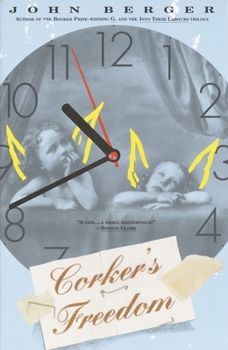Corker's Freedom
Select Format
Select Condition 
Book Overview
Booker Prize-winning author John Berger brings us this tender and bittersweet novel is a book of dreams: dreams of freedom and romance, dreams that intoxicate and redeem, dreams that have the power to exalt their dreamers or dash them against hard truth. It is the unforgettable, often comical portrait of a dreamer, one William Corker, the genteel proprietor of a London employment agency, who, in his sixty-third year, has just moved out of the house...
Format:Paperback
Language:English
ISBN:0679755136
ISBN13:9780679755135
Release Date:March 1995
Publisher:Vintage
Length:240 Pages
Weight:0.65 lbs.
Dimensions:0.8" x 5.2" x 8.0"
Customer Reviews
2 ratings
Snatching freedom from the jaws of sacrifice
Published by Thriftbooks.com User , 20 years ago
Written thirty years ago and published in the U.S. for the first time in 1994, Berger's novel describes one day in the life of a man, 64 years old, who decides to claim his freedom. As the story opens William Corker has left his invalid sister and decided to move into rooms over his employment office. A bachelor, he sacrificed marriage and all his other potentials to care for, first, his mother, then his sister, crippled with rheumatism. The narrative moves between Corker's plans and reminiscences and his young assistant's observation of the change in his boss and the momentous change in his own life - he has just lost his virginity. Interspersed are paragraphs from the various people who come in seeking employment - a vigorous, middle aged housekeeper Corker fantasizes employing for himself; a young, snooty woman who demonstrates Corker's naivety and optimism while casing the joint for her boyfriend; and an elderly impoverished housekeeper terrified of being put in a home to die. Corker is ebullient, proud of himself and feeling daring. Alec, his assistant, is by turns suspicious and excited. Unable to quite overturn the habits of a lifetime, Corker sacrifices his visions of the blowsy housekeeper and tentatively decides on the elderly one - who's asking less than half normal wages. But he vacillates while Alec fumes with the impatience of youth, helping Corker shove furniture around upstairs and dreaming of his girl while he listens to the old man go on about art and travel. The tone is wistful and ironic with a hint of acid. The story builds to a climax which seems certain to end in disaster, what with an ongoing robbery, the entrance of the querulous sister and the addition of some unaccustomed alcohol. A trifle wordy but a poignant and humorous look at the contrast between sacrificed hopes and youthful incomprehension.
"I want to be less ignorant of the consequences of not being good."
Published by Thriftbooks.com User , 24 years ago
William Corker, ever-so-proper, and presumably celibate, has spent his life caring for his mother and his domineering sister, and now, at age 64, he has made the break, found his own apartment, and is living, joyfully, on his own, above the employment office where he works. The inner thoughts, memories, and poignant regrets of Corker as he approaches old age, contrast delightfully with the decidedly uncelibate, hormone-induced thoughts of his employee, 17-year-old Alec. Berger illuminates every possible intergenerational contrast and conflict here, evoking great humor and equally great sympathy for Corker and Alec, both of whom the reader recognizes as naïve. Within this delightful and amusing story, however, Berger deals with serious universal themes related to one's life goals and responsibilities, how one wants to be remembered, and how personal freedom is defined. After caring for others for sixty-four years, Berger's only desire is "I do not want to die as I am, when I die I want to be different, I want to be less ignorant of the consequences of not being good." Corker takes an irreversible step into his independent life during a tipsy travelogue of Vienna. It is here that Berger uses language most brilliantly to reveal the many ironies of Corker's life. What Corker actually says, what he knows, and what he would like to say to and about the other characters in the audience, all of whom have affected his life, are combined in this one stunning scene. We can observe him taking chances for the first time and experiencing "the general triumph of having spoken out and been listened to." Simultaneously, however, the reader is privy to ironic events that are taking place outside the lecture hall, events over which Corker has no control and which will force him to continue living his new, "free" life, whether or not he wants to. The epilogue which shows us Corker two years later, reveals Berger's consummate irony: Corker is still speaking out and still living free, though not in the way that either he or we would have predicted. A fine study of a man at the end of his life, the novel showcases Berger's masterful use of irony and brilliant manipulation of language, making this a novel that language lovers will not want to miss. Mary Whipple






